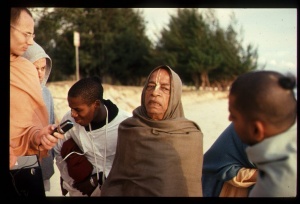SB 10.16.13-15: Difference between revisions
m (1 revision(s)) |
(Vanibot #0018 edit: make synonym terms in Sanskrit italic in SB - Vanisource) |
||
| Line 1: | Line 1: | ||
{{info | {{info | ||
|speaker= | |speaker=Śukadeva Gosvāmī | ||
|listener=King | |listener=King Parīkṣit | ||
}} | }} | ||
[[Category:Srimad-Bhagavatam - Canto 10 Chapter 16]] | |||
[[Category:Bhagavatam Verses Spoken by Sukadeva Gosvami - Vanisource|101613]] | |||
<div style="float:left">'''[[Srimad-Bhagavatam]] - [[SB 10|Tenth Canto]] - [[SB 10.16: Krsna Chastises the Serpent Kaliya|Chapter 16: Kṛṣṇa Chastises the Serpent Kāliya]]'''</div> | |||
<div style="float:right">[[File:Go-previous.png|link=SB 10.16.12]] '''[[SB 10.16.12]] - [[SB 10.16.16]]''' [[File:Go-next.png|link=SB 10.16.16]]</div> | |||
{{RandomImage}} | |||
{{SBnotice}} | |||
==== TEXTS 13-15 ==== | ==== TEXTS 13-15 ==== | ||
<div | <div class="verse"> | ||
tān ālakṣya bhayodvignā | :tān ālakṣya bhayodvignā | ||
gopā nanda-purogamāḥ | :gopā nanda-purogamāḥ | ||
vinā rāmeṇa gāḥ kṛṣṇaṁ | :vinā rāmeṇa gāḥ kṛṣṇaṁ | ||
jñātvā cārayituṁ gatam | :jñātvā cārayituṁ gatam | ||
tair durnimittair nidhanaṁ | |||
matvā prāptam atad-vidaḥ | :tair durnimittair nidhanaṁ | ||
tat-prāṇās tan-manaskās te | :matvā prāptam atad-vidaḥ | ||
duḥkha-śoka-bhayāturāḥ | :tat-prāṇās tan-manaskās te | ||
ā-bāla-vṛddha-vanitāḥ | :duḥkha-śoka-bhayāturāḥ | ||
sarve 'ṅga paśu-vṛttayaḥ | |||
nirjagmur gokulād dīnāḥ | :ā-bāla-vṛddha-vanitāḥ | ||
kṛṣṇa-darśana-lālasāḥ | :sarve 'ṅga paśu-vṛttayaḥ | ||
:nirjagmur gokulād dīnāḥ | |||
:kṛṣṇa-darśana-lālasāḥ | |||
</div> | </div> | ||
| Line 25: | Line 32: | ||
==== SYNONYMS ==== | ==== SYNONYMS ==== | ||
<div | <div class="synonyms"> | ||
''tān''—these signs; ''ālakṣya''—seeing; ''bhaya-udvignāḥ''—agitated by fear; ''gopāḥ''—the cowherds; ''nanda-puraḥ-gamāḥ''—headed by Nanda Mahārāja; ''vinā''—without; ''rāmeṇa''—Balarāma; ''gāḥ''—the cows; ''kṛṣṇam''—Kṛṣṇa; ''jñātvā''—understanding; ''cārayitum''—to herd; ''gatam''—gone; ''taiḥ''—from those; ''durnimittaiḥ''—bad omens; ''nidhanam''—destruction; ''matvā''—considering; ''prāptam''—attained; ''atat-vidaḥ''—not knowing His opulences; ''tat-prāṇāḥ''—having Him as their very source of life; ''tat-manaskāḥ''—their minds being absorbed in Him; ''te''—they; ''duḥkha''—by pain; ''śoka''—unhappiness; ''bhaya''—and fear; ''āturāḥ''—overwhelmed; ''ā-bāla''—including the children; ''vṛddha''—old persons; ''vanitāḥ''—and ladies; ''sarve''—all; ''aṅga''—my dear King Parīkṣit; ''paśu-vṛttayaḥ''—behaving as an affectionate cow does toward her calf; ''nirjagmuḥ''—they went out; ''gokulāt''—from Gokula; ''dīnāḥ''—feeling wretched; ''kṛṣṇa-darśana''—for the sight of Lord Kṛṣṇa; ''lālasāḥ''—anxious. | |||
</div> | </div> | ||
{{SBcollapse}} | |||
==== TRANSLATION ==== | ==== TRANSLATION ==== | ||
<div | <div class="translation"> | ||
Seeing the inauspicious omens, Nanda Mahārāja and the other cowherd men were fearful, for they knew that Kṛṣṇa had gone to herd the cows that day without His elder brother, Balarāma. Because they had dedicated their minds to Kṛṣṇa, accepting Him as their very life, they were unaware of His great power and opulence. Thus they concluded that the inauspicious omens indicated He had met with death, and they were overwhelmed with grief, lamentation and fear. All the inhabitants of Vṛndāvana, including the children, women and elderly persons, thought of Kṛṣṇa just as a cow thinks of her helpless young calf, and thus these poor, suffering people rushed out of the village, intent upon finding Him. | Seeing the inauspicious omens, Nanda Mahārāja and the other cowherd men were fearful, for they knew that Kṛṣṇa had gone to herd the cows that day without His elder brother, Balarāma. Because they had dedicated their minds to Kṛṣṇa, accepting Him as their very life, they were unaware of His great power and opulence. Thus they concluded that the inauspicious omens indicated He had met with death, and they were overwhelmed with grief, lamentation and fear. All the inhabitants of Vṛndāvana, including the children, women and elderly persons, thought of Kṛṣṇa just as a cow thinks of her helpless young calf, and thus these poor, suffering people rushed out of the village, intent upon finding Him. | ||
</div> | </div> | ||
__NOTOC__ | </div> | ||
</div> | |||
<div style="float:right">[[File:Go-previous.png|link=SB 10.16.12]] '''[[SB 10.16.12]] - [[SB 10.16.16]]''' [[File:Go-next.png|link=SB 10.16.16]]</div> | |||
__NOTOC__ | |||
__NOEDITSECTION__ | |||
Revision as of 12:44, 1 December 2017

A.C. Bhaktivedanta Swami Prabhupada
Please note: The synonyms, translation and purport of this verse were composed by disciples of Śrīla Prabhupāda
TEXTS 13-15
- tān ālakṣya bhayodvignā
- gopā nanda-purogamāḥ
- vinā rāmeṇa gāḥ kṛṣṇaṁ
- jñātvā cārayituṁ gatam
- tair durnimittair nidhanaṁ
- matvā prāptam atad-vidaḥ
- tat-prāṇās tan-manaskās te
- duḥkha-śoka-bhayāturāḥ
- ā-bāla-vṛddha-vanitāḥ
- sarve 'ṅga paśu-vṛttayaḥ
- nirjagmur gokulād dīnāḥ
- kṛṣṇa-darśana-lālasāḥ
SYNONYMS
tān—these signs; ālakṣya—seeing; bhaya-udvignāḥ—agitated by fear; gopāḥ—the cowherds; nanda-puraḥ-gamāḥ—headed by Nanda Mahārāja; vinā—without; rāmeṇa—Balarāma; gāḥ—the cows; kṛṣṇam—Kṛṣṇa; jñātvā—understanding; cārayitum—to herd; gatam—gone; taiḥ—from those; durnimittaiḥ—bad omens; nidhanam—destruction; matvā—considering; prāptam—attained; atat-vidaḥ—not knowing His opulences; tat-prāṇāḥ—having Him as their very source of life; tat-manaskāḥ—their minds being absorbed in Him; te—they; duḥkha—by pain; śoka—unhappiness; bhaya—and fear; āturāḥ—overwhelmed; ā-bāla—including the children; vṛddha—old persons; vanitāḥ—and ladies; sarve—all; aṅga—my dear King Parīkṣit; paśu-vṛttayaḥ—behaving as an affectionate cow does toward her calf; nirjagmuḥ—they went out; gokulāt—from Gokula; dīnāḥ—feeling wretched; kṛṣṇa-darśana—for the sight of Lord Kṛṣṇa; lālasāḥ—anxious.
Translation and purport composed by disciples of Śrīla Prabhupāda
TRANSLATION
Seeing the inauspicious omens, Nanda Mahārāja and the other cowherd men were fearful, for they knew that Kṛṣṇa had gone to herd the cows that day without His elder brother, Balarāma. Because they had dedicated their minds to Kṛṣṇa, accepting Him as their very life, they were unaware of His great power and opulence. Thus they concluded that the inauspicious omens indicated He had met with death, and they were overwhelmed with grief, lamentation and fear. All the inhabitants of Vṛndāvana, including the children, women and elderly persons, thought of Kṛṣṇa just as a cow thinks of her helpless young calf, and thus these poor, suffering people rushed out of the village, intent upon finding Him.